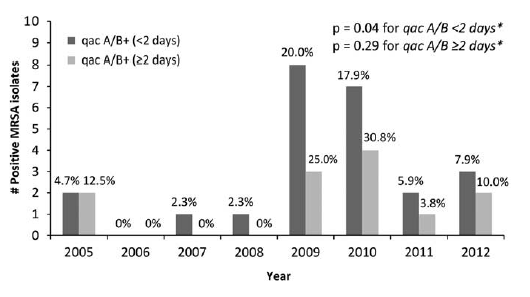MRSA: It's Not Just for Patients Anymore
Over the past year, four studies in the US have reported MRSA colonization prevalence rates in healthcare workers. Each study sampled at least 100 workers. In Pittsburgh, the colonization rate among emergency department workers was 4%. In a study of HCWs who cared for dialysis patients in Michigan, the colonization prevalence was 5%. At a Texas pediatric hospital, 12% were found to be colonized, and in an Illinois emergency department, 15% of HCWs were coloinzed.
While active surveillance proponents could argue that some of these healthcare workers may have avoided colonization had all colonized patients been identified and isolated, the avoidable proportion is unknown. However, even in hospitals with aggressive active surveillance programs, unless patients are isolated until proven to not be colonized, the possibility of transmission could still occur prior to the institution of contact precautions. And just because a patient is in contact precautions does not mean that the potential for transmission to the HCW is eliminated. Thus, on many levels the active surveillance-contact precautions approach falls short.
As the AIDS epidemic unfolded in the mid-1980s, CDC wisely never recommended that all patients be tested for HIV and precautions applied to only those patients who were infected. Rather, assuming that all patients could be infected was the foundation for universal precautions, an enormously successful public health intervention. We should use similar thinking in our approach to multidrug resistant organisms. Rather than culturing patients for every conceivable MDRO, focusing on excellent infection control practices in the care of all patients (the so-called “horizontal” approach to infection control) reduces the potential for transmission of all organisms that are transmitted via direct or indirect contact.
The increasing proportion of MRSA colonized HCWs should serve as a reminder that colonized patients are not the only source of MDROs in hospitals. Given the rising prevalence of MRSA in the community, transmission of MRSA in the hospital will increasingly occur from colonized HCWs and visitors. This is just another reason that we will never be able to culture our way out of this problem.
While active surveillance proponents could argue that some of these healthcare workers may have avoided colonization had all colonized patients been identified and isolated, the avoidable proportion is unknown. However, even in hospitals with aggressive active surveillance programs, unless patients are isolated until proven to not be colonized, the possibility of transmission could still occur prior to the institution of contact precautions. And just because a patient is in contact precautions does not mean that the potential for transmission to the HCW is eliminated. Thus, on many levels the active surveillance-contact precautions approach falls short.
As the AIDS epidemic unfolded in the mid-1980s, CDC wisely never recommended that all patients be tested for HIV and precautions applied to only those patients who were infected. Rather, assuming that all patients could be infected was the foundation for universal precautions, an enormously successful public health intervention. We should use similar thinking in our approach to multidrug resistant organisms. Rather than culturing patients for every conceivable MDRO, focusing on excellent infection control practices in the care of all patients (the so-called “horizontal” approach to infection control) reduces the potential for transmission of all organisms that are transmitted via direct or indirect contact.
The increasing proportion of MRSA colonized HCWs should serve as a reminder that colonized patients are not the only source of MDROs in hospitals. Given the rising prevalence of MRSA in the community, transmission of MRSA in the hospital will increasingly occur from colonized HCWs and visitors. This is just another reason that we will never be able to culture our way out of this problem.



Comments
Post a Comment
Thanks for submitting your comment to the Controversies blog. To reduce spam, all comments will be reviewed by the blog moderator prior to publishing. However, all legitimate comments will be published, whether they agree with or oppose the content of the post.